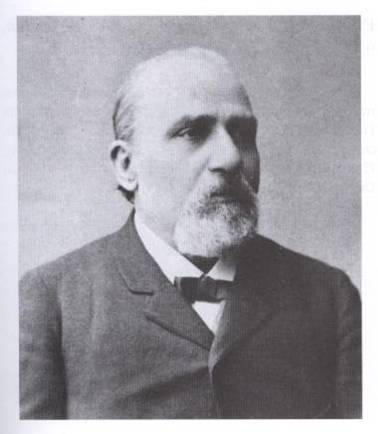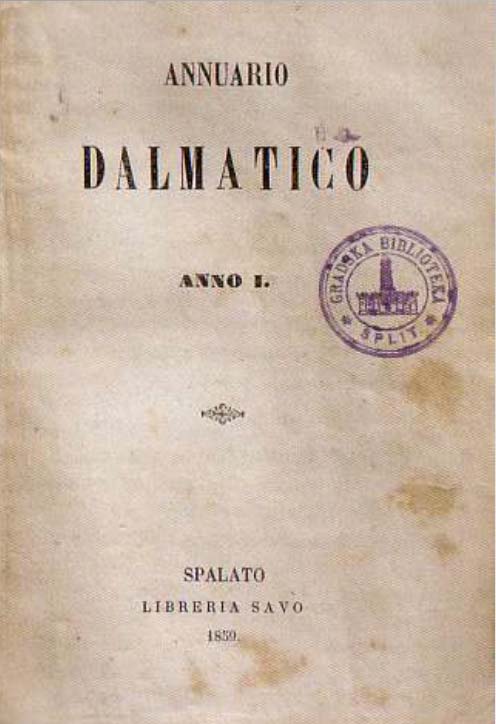|
People's Party (Kingdom Of Dalmatia)
People's Party () was a political party in the Kingdom of Dalmatia. It was founded in 1861 after the failure of Bach's absolutism, as a branch of the People's Party in Kingdom of Croatia-Slavonia. Its members were known as ''narodnjaci'', ''aneksionisti'' or ''puntari''. Its political goal was uniting Dalmatia with Croatia and Slavonia, stemming from their ideological origins in the Illyrian movement. It also gathered prominent Dalmatian Italians as well as Dalmatian Serbs. However, a Serb faction splintered in 1878, led by Stjepan Mitrov Ljubiša, into the Serb People's Party. From 1887 People's Party was renamed People's Croatian Party (), as a result of an internal compromise between the conservative majority led by Miho Klaić and a radical minority led by Mihovil Pavlinović and Juraj Biankini. It united with the Party of Rights in 1905 into the "Croatian Party". Notable members * Gajo Bulat *Miho Klaić * Lovro Monti * Vid Morpurgo * Natko Nodilo *Mihovil Pavlinović * ... [...More Info...] [...Related Items...] OR: [Wikipedia] [Google] [Baidu] |
Narodni List
''Narodni list'' () is an independent Croatian weekly newspaper published in Zadar, founded in 1862, making it the oldest in Croatia. ''Narodni list'', being independent, has a reputation of writing about things other newspapers dare not touch, such as Political corruption, corruption and nepotism among politicians, which often includes writing about organized crime. This newspaper is not to be confused with Narodni list (USA), ''Narodni list'' (USA) that was published in New York by Frank Zotti from 1895. History The newspaper was started in 1862, making it the oldest living newspaper in Croatia, and a part of Croatian cultural history. The first issue of ''Narodni list'' was published on March 1, 1862, as a Croatian-language part of the Italian-language newspaper ''Il Nazionale''. Since 1876, ''Narodni list'' is published entirely in Croatian, playing an important role in unification of Dalmatia and Croatia. In 1871, Juraj Biankini became the editor of the ''Narodni list'' at ... [...More Info...] [...Related Items...] OR: [Wikipedia] [Google] [Baidu] |
Juraj Biankini
Juraj Biankini (30 August 1847 in Stari Grad – 27 March 1928 in Split) was a journalist and Croatian and Yugoslavian politician. He moved to Zadar to attend high school and theological seminary (a part of the present-day University of Zadar). In 1871, Biankini became the editor of the Zadar-based ''Narodni list'' at urging of Mihovil Pavlinović, the leader of the Croatian National Revival in Dalmatia. He retained the position until 1918 (when Zadar was captured by the Kingdom of Italy enforcing the Treaty of London). Biankini's work helped the newspaper attain a leading position in the region. Biankini was elected a member of the Diet of Dalmatia (1881–1887 and 1889–1918), and a member of the Imperial Council (1892–1918). Initially, he was a member of the People's Party, but he left its ranks in disagreement with the party's opportunistic policies—together with fellow Imperial Council members , Vjekoslav Spinčić, , and Matko Laginja. He subsequently co-founded ... [...More Info...] [...Related Items...] OR: [Wikipedia] [Google] [Baidu] |
Defunct Political Parties In Croatia
{{Disambiguation ...
Defunct may refer to: * ''Defunct'' (video game), 2014 * Zombie process or defunct process, in Unix-like operating systems See also * * :Former entities * End-of-life product * Obsolescence Obsolescence is the process of becoming antiquated, out of date, old-fashioned, no longer in general use, or no longer useful, or the condition of being in such a state. When used in a biological sense, it means imperfect or rudimentary when comp ... [...More Info...] [...Related Items...] OR: [Wikipedia] [Google] [Baidu] |
Political Parties In Austria-Hungary
Politics () is the set of activities that are associated with decision-making, making decisions in social group, groups, or other forms of power (social and political), power relations among individuals, such as the distribution of Social status, status or resources. The branch of social science that studies politics and government is referred to as political science. Politics may be used positively in the context of a "political solution" which is compromising and non-violent, or descriptively as "the art or science of government", but the word often also carries a negative connotation.. The concept has been defined in various ways, and different approaches have fundamentally differing views on whether it should be used extensively or in a limited way, empirically or normatively, and on whether conflict or co-operation is more essential to it. A variety of methods are deployed in politics, which include promoting one's own political views among people, negotiation with other ... [...More Info...] [...Related Items...] OR: [Wikipedia] [Google] [Baidu] |
Political Parties Established In 1861
Politics () is the set of activities that are associated with making decisions in groups, or other forms of power relations among individuals, such as the distribution of status or resources. The branch of social science that studies politics and government is referred to as political science. Politics may be used positively in the context of a "political solution" which is compromising and non-violent, or descriptively as "the art or science of government", but the word often also carries a negative connotation.. The concept has been defined in various ways, and different approaches have fundamentally differing views on whether it should be used extensively or in a limited way, empirically or normatively, and on whether conflict or co-operation is more essential to it. A variety of methods are deployed in politics, which include promoting one's own political views among people, negotiation with other political subjects, making laws, and exercising internal and external f ... [...More Info...] [...Related Items...] OR: [Wikipedia] [Google] [Baidu] |
Stefan Mitrov Ljubiša
Stefan may refer to: * Stefan (given name) * Stefan (surname) * Ștefan, a Romanian given name and a surname * Štefan, a Slavic given name and surname * Stefan (footballer) (born 1988), Brazilian footballer * Stefan Heym, pseudonym of German writer Helmut Flieg (1913–2001) * Stefan (honorific), a Serbian title * Stefan (album), ''Stefan'' (album), a 1987 album by Dennis González See also * Stefan number, a dimensionless number used in heat transfer * Sveti Stefan or Saint Stefan, a small islet in Montenegro * Stefanus (other) {{Disambiguation ... [...More Info...] [...Related Items...] OR: [Wikipedia] [Google] [Baidu] |
Konstantin Vojnović
Konstantin "Kosta" Vojnović ( sr-Cyrl, Константин Војновић; ; March 2, 1832 – May 20, 1903) was a Croatian Serb politician, university professor, and rector in the kingdoms of Kingdom of Dalmatia, Dalmatia and Kingdom of Croatia-Slavonia, Croatia-Slavonia of the Habsburg monarchy. Life Family Vojnović was born in Herceg Novi (Kingdom of Dalmatia, modern Montenegro) into the Serbs, Serb Vojnović noble family. His grandfather Đorđe Vasiljević Vojnović (1760–1821) was a Russian military officer, he later returned to Boka Kotorska, and in 1800, in Ancona, he married Kasandra Angeli-Radovani from a Roman Catholic family. They had a son, Jovan. Count Jovan Đ. Vojinović (1811–1837) died at the age of 26, he married Katarina Gojković whose mother was of the family of Serbian Orthodox Metropolitan Stevan Stratimirović. Katarina later remarried to a Pellegrini (surname), Pellegrini. Jovan and Katarina had two sons, Konstantin (Kosta), and his brother Đor� ... [...More Info...] [...Related Items...] OR: [Wikipedia] [Google] [Baidu] |
Jovan Sundečić
Jovan Sundečić (Serbian Cyrillic: Јован Сундечић; 24 June 1825 – 19 July 1900) was a Serbs, Serbian poet, priest of the Serbian Orthodox Church and a secretary to Prince Nikola I of Montenegro. He is most famous for writing lyrics of contemporary anthem of Montenegro Ubavoj nam Crnoj Gori (''To Our Beautiful Montenegro'').He also lived in Livno as a priest of orthodox churchGlas Crnogorca, 19 October 1999; Jovan MarkušДвије црногорске химне/ref> Biography Sundečić was born in the village of Golinjevo, near Livno, Bosnia Eyalet, Ottoman Empire, (modern-day Bosnia and Herzegovina). His family is of the Šundić brotherhood from Župa near Nikšić in Old Herzegovina. After finishing the Orthodox Seminary in Zadar (1843-1848), Dalmatia province of the Austrian Empire and becoming a priest, he was assigned parish priest and teacher to the Serb colony of Peroj in Istria, Austrian Littoral. After working as a professor at the Zadar Seminary, he ... [...More Info...] [...Related Items...] OR: [Wikipedia] [Google] [Baidu] |
Lujo Bakotić
Lujo Bakotić (21 November 1867 – 31 March 1941) was a Serbian writer, publicist, lawyer, lexicographer and diplomat. Biography Bakotić was born in Senj to Ignjat Bakotić and Adela Gravisi. He was baptized Alojzije ("Lujo") Juraj Franjo Ivan Josip Bakotić. Though he was Roman Catholic, Bakotić considered himself Serbian, as had his father. He completed his high school (gymnasium) education in Split, and jurisprudence in Vienna and Graz. He was a lawyer by profession who was also politically active, representing the Serbian Party in the Diet of Dalmatia. Owing to his party's ideals he had to flee to Serbia in 1913. With the start of the Great War, he left Belgrade for Niš and then went to Paris and finally Rome, where he was made a secretary in the Vatican to work on a mission, preparing a Concordat A concordat () is a convention between the Holy See and a sovereign state that defines the relationship between the Catholic Church and the state in matters that concern b ... [...More Info...] [...Related Items...] OR: [Wikipedia] [Google] [Baidu] |
Natko Nodilo
Natko Nodilo (31 August 1834 – 21 May 1912) was a Croatian politician, historian, journalist, university professor, and chancellor of the University of Zagreb. Born in Split, he studied theology in Zadar until 1856, when he dropped out of college and took a job as an auxiliary teacher at the Classical Gymnasium in Split. He received a degree in history and geography in Vienna in 1861. He then turned to politics, becoming the editor of the new magazine ''Il Nazionale'', in which he published articles on the principles of national and liberal politics. He was prosecuted in court because of his articles. After abandoning his job as editor, he worked as a teacher at the high school in Zadar and as a representative of the People's Party in the Parliament of Dalmatia, advocating the unification of Dalmatia with Croatia. In 1857 he was appointed as the first professor of general history at the University of Zagreb. After his term as chancellor for the 1890–91 academic year expire ... [...More Info...] [...Related Items...] OR: [Wikipedia] [Google] [Baidu] |
Vid Morpurgo
Vid Morpurgo (1838–1911) was a Dalmatian industrialist, publisher, politician and member of a notable Split family Morpurgo. Early years and family Morpurgo was born on 7 May 1838 in Split, Dalmatia to a well-known Jewish family of David-Elija and Anetta (née Gentili) Morpurgo. His great-great-grandfather David-Vita moved to Split in 1774 from Maribor ( Ger.: Marburg), Slovenia. He chose his surname ''Morpurgo'' from the Italian version of the German ''Marburger'' (i.e. someone from Marburg). From 1846 to 1849 Morpurgo attended and finished elementary school in Split. Later he attended the Royal grammar school in Split from which he graduated in 1856. Political and business career After completing his education, Morpurgo was employed at the library which was co-owned by his father and his business partner Petar Savo. There Morpurgo developed bookseller activity enabling him partnership with numerous foreign publishing houses. In 1855 he traveled to Trieste, Italy to sign con ... [...More Info...] [...Related Items...] OR: [Wikipedia] [Google] [Baidu] |



